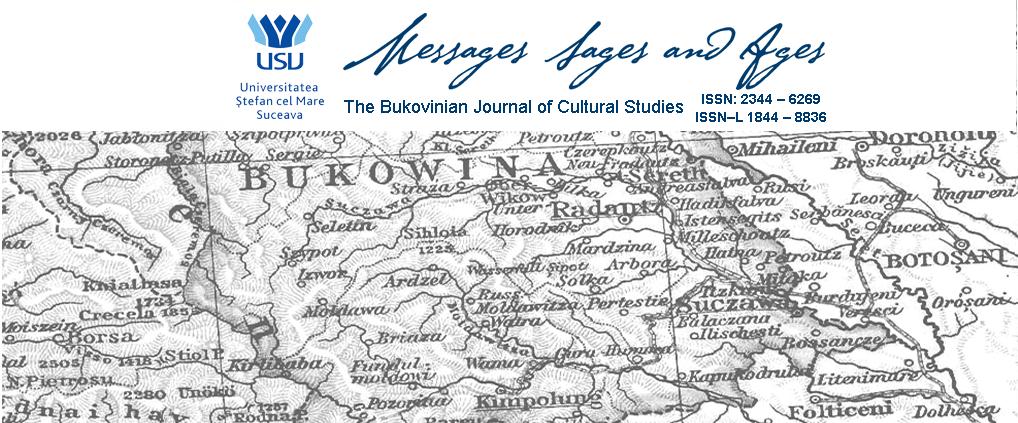Editor: Onoriu Colăcel
CULTURAL DIFFUSION AND THE MEDIA IMPACT OF LABOR MIGRATION: BRITISH-ROMANIAN PERSPECTIVES – Onoriu Colăcel
The representation of im(e)migration in Romanian-language cultures is undergoing dramatic change. Migration in the UK, working knowledge of English, and the ready availability of online English-language news to (young and adult) Romanian audiences are significant means for diffusing a culture…
GOING DOWN THE RABBIT HOLE OF WORDSMITHERY – Evelina Mezalina Graur
The present article revisits two basic linguistic models and links them to the onomasiological model of word formation. The first section of the articles focusses on the main tenets of Štekauer’s model of research into English word-formation and points to…
THE MEANING OF HUMANITY AND THE UNBEARABLE EXISTENCE AS THE OTHER IN KAZUO ISHIGURO’S NEVER LET ME GO – Hreceniuc (Cîrdei) Evelina-Iulia
The world delineated by Kazuo Ishiguro in Never Let Me Go determines the reader to question the way in which the human body is perceived in a world dominated by technology. The intoxicating presence of technology has made cloning possible,…
Messages, Sages, and Ages vol. 10, no. 1, August 2023
Editor: Daniela Maria Marțole
IMMANENTISM AND TRANSCENDENTALISM IN THE NARRATOLOGY OF DYSTOPIAN FICTION CONCEPTUALISATION – Ruth Naomi Lupu
The 20th century —fragile, fractured and corroded as it has been— emerges from the depths of human idiosyncrasy with the banner of freedom in hand. Corruption, oppression, disease and death have given way to a completely alienated society —in most…
NINETEEN EIGHTY-FOUR BY GEORGE ORWELL AND THE SOCIAL MEDIA AGE BY ZOETANYA SUJON: LITERARY MOTIFS AND THE DIGITALISATION OF OUR SOCIETY – Ioana-Lăcrimioara Pelea
Starting from the significance of reading dystopian fiction and analyzing the symbols behind the surface level of the story, this paper aims to discover the direct link between the diegetic world created by George Orwell in Nineteen Eighty-Four and the…
PSYCHOANALYSIS OF FEMALE IDENTITY: JANE EYRE BY CHARLOTTE BRONTE AND THE YELLOW WALLPAPER BY CHARLOTTE PERKINS GILMAN – Cătălina Roșca
This paper aims to analyze the connection between psychoanalysis and feminist criticism in Jane Eyre by Charlotte Bronte and The Yellow Wallpaper by Charlotte Perkins Gilman. Through self-reflection into the female characters’ life and by concluding how a character ends…
GATEKEEPERS AND CONSENSUS IN TODAY’S ‘CULTURED’ CIRCLES – Cristina Badiu
Culture has been a well disputed concept over time. This paper aims to briefly look at some of those who shape the meaning of the word in the Western Culture, past and present, and show their arguments, why they are…
AGAIN BUT BETTER. THE REPRESENTATION OF THE CANADIAN IDENTITY IN THE 2017 ADAPTATION OF ANNE OF GREEN GABLES – Mirela Antonovici
Since intersemiotic translation continues to maintain its popularity even among the younger generation, this paper examines the way in which Canadian identity is portrayed in the most recent film adaptation of the beloved piece of children’s literature, Anne of Green…
REFLECTIONS OF DRACULA IN CONTEMPORARY POPULAR CULTURE – Iuliana-Elena Asoltanei
From its appearance in Bram Stoker’s novel, Dracula has withstood the test of time and achieved a sense of immortality in popular culture. This is in part due to its many reflections in adaptations and retellings until today. Many of…
THE HUMAN BODY AS A COMMODITY IN KAZUO ISHIGURO’S NEVER LET ME GO – Evelina-Iulia Hreceniuc (Cîrdei)
The article focuses on the status of the human body in Kazuo Ishiguro’s dystopian novel Never Let Me Go, in the context of the practice of cloning for the purpose of organ harvesting. The clones in the novel are originally…
LABYRINTH OR ILLUSION: REPETITION AND VARIATION IN E.A. POE’S SHORT FICTION – Andreea Filip
Edgar Allan Poe’s short stories are some of the best-known in the literary world, but they are also some of the easiest to recognize if you pay attention not only to his particular style and the infamous sense of dread…
Messages, Sages and Ages, Vol. 9, No. 2, (2022)
Editor: Onoriu Colăcel
INTERETHNIC RELATIONSHIPS AS REFLECTED IN PLACE NAMES OF SOUTHERN TRANSYLVANIA – Andrea Maxiniuc
Transylvania has a long history of interethnic contacts – both peaceful and conflicting. As a result, a multitude of either “shared” or divergent place names were recorded in all regions of the respective province throughout centuries. The focus of this…
